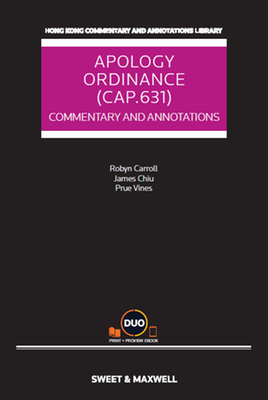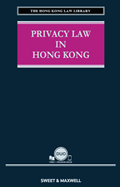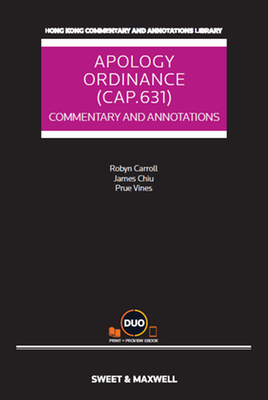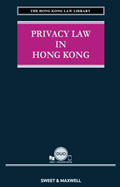The thorough commentary, informed by comparative law … makes the book an asset not only for readers involved in the application of the Ordinance in Hong Kong, but also for those involved in the interpretation and application of similar provisions in other parts of the world.
Format
eBook
Price
(starting at)
HKD 600.00
This is the first book in Hong Kong dealing with privacy law generally, rather than dealing only with data privacy. The existing books in Hong Kong largely only focus on the Personal Data (Privacy) Ordinance. The book provides discussion of the Ordinance (useful for legal practitioners as well as in-house counsel and other staff in businesses and private or public organisations who have responsibilities for ensuring legal compliance in handling of personal data) as well as other statutory and common law remedies which may be available for privacy invasions. The book draws together the disparate sources of law relating to privacy in Hong Kong and provides both a holistic overview of the legal regulation of privacy and a detailed analysis of the statutory regime and case law.
There have been significant common law developments in the UK, with the development of a common law action for misuse of private information. The book discusses in detail this new tort in England and assesses the possibilities of application of the tort in Hong Kong. The book also analyses in detail the case law both in Hong Kong and other common law jurisdictions on other common law torts which may provide civil remedies for invasions of privacy in particular circumstances. Key cases discussed include—in relation to the common law action for misuse of private information: Campbell v MGN Ltd [2004] 2 AC 457 (House of Lords) and PJS v News Group Newspapers Ltd [2016] AC 1081 (Supreme Court); and in relation to other common law actions in the privacy context: Fearn v Board of Trustees of the Tate Gallery [2020] 2 WLR 1081 (Court of Appeal) (nuisance) and Smethurst v Commissioner of the Australian Federal Police (2020) 94 ALJR 502 (High Court of Australia) (trespass).
The book examines the main legislation in Hong Kong on privacy: Personal Data (Privacy) Ordinance. The discussion includes principles and illustrations from case law on the data protection principles and other requirements of the Ordinance, including decisions of both the courts and of the Administrative Appeals Board. The book also discusses the regulatory approach of the Privacy Commissioner and guidance from the Commissioner in the application of the Ordinance.
The book also discusses constitutional and human rights protections for privacy, including Hong Kong case law, as well as certain miscellaneous statutory provisions (including relevant criminal law offences) which protect privacy interests.
The introductory chapters of the book analyse, from the theoretical perspective, the concept of privacy, as well as theories and justifications for the protection of privacy, which is critical in the information age. These chapters may be of wider interest, for example to academics, law students and others who wish to have a broader understanding of privacy over and above the legal rules and principles.
Format
eBook
Price
(starting at)
HKD 1,760.00
The thorough commentary, informed by comparative law … makes the book an asset not only for readers involved in the application of the Ordinance in Hong Kong, but also for those involved in the interpretation and application of similar provisions in other parts of the world.
Format
Book & eBook
Price
(starting at)
HKD 750.00
This is the first book in Hong Kong dealing with privacy law generally, rather than dealing only with data privacy. The existing books in Hong Kong largely only focus on the Personal Data (Privacy) Ordinance. The book provides discussion of the Ordinance (useful for legal practitioners as well as in-house counsel and other staff in businesses and private or public organisations who have responsibilities for ensuring legal compliance in handling of personal data) as well as other statutory and common law remedies which may be available for privacy invasions. The book draws together the disparate sources of law relating to privacy in Hong Kong and provides both a holistic overview of the legal regulation of privacy and a detailed analysis of the statutory regime and case law.
There have been significant common law developments in the UK, with the development of a common law action for misuse of private information. The book discusses in detail this new tort in England and assesses the possibilities of application of the tort in Hong Kong. The book also analyses in detail the case law both in Hong Kong and other common law jurisdictions on other common law torts which may provide civil remedies for invasions of privacy in particular circumstances. Key cases discussed include—in relation to the common law action for misuse of private information: Campbell v MGN Ltd [2004] 2 AC 457 (House of Lords) and PJS v News Group Newspapers Ltd [2016] AC 1081 (Supreme Court); and in relation to other common law actions in the privacy context: Fearn v Board of Trustees of the Tate Gallery [2020] 2 WLR 1081 (Court of Appeal) (nuisance) and Smethurst v Commissioner of the Australian Federal Police (2020) 94 ALJR 502 (High Court of Australia) (trespass).
The book examines the main legislation in Hong Kong on privacy: Personal Data (Privacy) Ordinance. The discussion includes principles and illustrations from case law on the data protection principles and other requirements of the Ordinance, including decisions of both the courts and of the Administrative Appeals Board. The book also discusses the regulatory approach of the Privacy Commissioner and guidance from the Commissioner in the application of the Ordinance.
The book also discusses constitutional and human rights protections for privacy, including Hong Kong case law, as well as certain miscellaneous statutory provisions (including relevant criminal law offences) which protect privacy interests.
The introductory chapters of the book analyse, from the theoretical perspective, the concept of privacy, as well as theories and justifications for the protection of privacy, which is critical in the information age. These chapters may be of wider interest, for example to academics, law students and others who wish to have a broader understanding of privacy over and above the legal rules and principles.
Format
Book & eBook
Price
(starting at)
HKD 2,200.00



